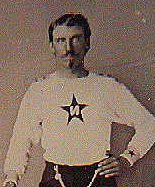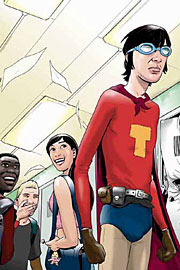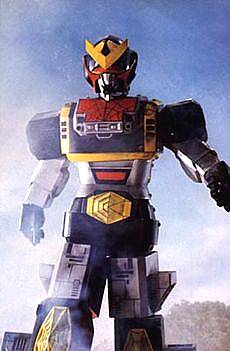|
|
|
|
Late
one night, a destitute Jason Schachat was led into
a mysterious subway tunnel...
|
Jason Schachat's Weekly Breakdown
November 19, 2004, page 1
Each
week, Jason Schachat takes you along for his ride on the
four-colored pulp pony. Feed the addiction, and the addiction
feeds you.
They made a serious attempt at a Space Ghost
comic...
Why’d they make a serious attempt
at a Space Ghost comic?
I love Alex Toth designs as much as the
next guy, but come on! Does this mean they also have Birdman
and Sealab 2020 books in the works? The mind boggles…
Though
it may be a bit late in retelling how the Avengers first
got together, Avengers: Earth’s Mightiest
Heroes #2 continues to reinvent the origin
of the now defunct superteam. Having fished Captain America
out of the ocean last time around, Tony Stark seizes the
opportunity to use Cap’s security clearance as a much
needed boost to the team’s power.
Cap, however, is still a little woozy from
spending most of the last century in a block of ice and
keeps flashing back to World War II. Giant Man and a few
others question his sanity, but the ever faithful Jarvis
supports Cap wholeheartedly, remembering the great icon
from his own youth that inspired a nation to fight the good
fight. Thor finds the whole undertaking thoroughly without
honor, but then disappears when Tony questions him about
his godhood. So the question still remains: will Cap crack?
This
series has some good points and some bad points. It serves
almost as a bridge between the modern adventures in Ultimates
and the classic adventures of the original Avengers,
borrowing from the team’s history but telling the
story with a darker, more modern slant. In many ways, it
relates to the current atmosphere in America and the question
we keep asking: Who can you trust? These Avengers are having
a hard time relying on one another, but can we really say
that doesn’t make sense after dealing with Hulk and
each others’ secrets?
Joe
Casey’s written this style before, but it manages
to stay just fresh enough to keep the reader involved. These
aren’t your father’s Avengers. That’s
for sure. But it’s not a complete re-imagining, either.
Scott Kolins' art, on the other hand, doesn’t do much
for me. Maybe it’s the way he inks his own lines.
There’s a squiggly quality to it that’s somewhere
between Frank Quitely and Corey Walker (Invincible)
which, despite rare moments, doesn’t do enough for
me to give this more than a mild recommendation.
Remember
the DC Focus line? You know? That ill-fated experiment to
launch a new imprint? “Superpowers— but not
superheroes!”? Yeah, didn’t think you’d
remember… even though the line didn’t even start
a year ago. All of its titles have gradually died off, and,
unfortunately, Kinetic now joins its brethren in
cancelled comic hell.
|
|
|
Wait...I
think I went to school with this guy...
|
Kinetic
#8 starts Tom off considering a superhero
career. Until he tears through his Isotoner gloves when
making a fist and gets a load of what he looks like in the
mirror. School doesn’t fare much better for him. Then,
he spends god knows how long waiting for the girl he likes
(the one he accidentally spied on when she was undressing)
to show up at her locker. Of course, with Tom’s luck,
she immediately punches him in the face, and, wouldn’t
you know it, his powers seem to have taken a vacation just
as his nose starts gushing blood.
To add
a bit of insult to its cancellation, the cover of this book
is bereft of the DC Focus logo. I can’t say what sense
that makes, since this issue closes the story out and, unlike
Hard Time, doesn’t seem destined for a life
beyond Focus. However, it may have a better reception when
collected for the trade paperback.
If the story had one glaring flaw, it was
the extremely quiet storytelling. Warren Pleece’s
artwork may have been a little too far from superhero standards,
but it never let down, and Kelley Puckett managed to make
an unappealing, introverted protagonist fun to watch and
easy to relate to. The story, on the other hand, remained
simple and slow-moving for the entire run. Not a bad thing,
but it was a kiss of death in this fickle market.
This
issue closes the tale with charm and the bravery of a book
that knows it’s never coming back. It answers our
questions about Tom’s powers, resolves his romantic
quandary, and finally shows him what was missing in his
life. It’s a great story of a shy teenager getting
everything he wants, and the sooner DC puts out a collected
edition, the better. Kinetic getting cancelled
was no surprise; wrapping up the story with such aplomb
was.
But
the big surprise of the week comes in the form of Eric Adams’
Lackluster World #1, a delightfully
dark new mini that would be depressing in its gloomy assessment
of the modern world if not for the wicked joy leaking off
the pages. Detailing the life of a pissed off albino journalist,
this chronicle opens with a typical bad day at work where
our hero, Fahrenheit, is teased by workmate Cog (who prefers
being called that to his given name of Herman Cogswell)
before being shuttled off to his own birthday party by religious
fanatic siblings Kelvin and Celcius.
It’s after the raucous celebration
of God’s love, scary clowns, and Fahrenheit’s
birthday that something finally snaps in our hero (most
likely prompted by a combination of bad television and the
news that Kelvin just won $20,000, which he plans to give
to the church). Our story then loops back to the opening
montage where Fahrenheit painted corpse outlines all over
an intersection, surrounding the words “You are already
dead”; proudly reiterating his theory that everyone
in the city is too busy with unimportant crap to be living.
Of course, Fahrenheit manages to slip away
from the scene scot-free, but that doesn’t mean his
mission is over. Oh, not by a longshot.
We’ve
seen a lot of books that tell us “people suck”
and then go on to spout diatribes about how the main characters
are so much smarter than everyone else, even though they
just sit around all day saying “people suck”.
Lackluster World cleverly avoids this indie book
pitfall by combining the tale of a dark everyman with an
expressionist cartooning that doesn’t wallow in self
pity but also avoids the goofy bloodspray found in so many
post-Johnny the Homicidal Maniac books.
Rather than making the supporting characters
a gaggle of drooling morons, Adams instead demonstrates
how “going with the flow” destroys your sense
of self. Sure, Fahrenheit may not be happy as the only self-aware
person in a city of drones, but, upon self examination,
he has a lot more going on than his religious zombie siblings
or the more outgoing Cog. While forces in this world may
conspire to make us unite and conform, it always comes down
to what makes YOU happy. Definitely recommended.
Unlike
my esteemed editor Mr. McCaw, I was delighted at the prospect
of Spider-Man India. JMS has already pushed the franchise
further toward mysticism than anyone would’ve imagined,
so I couldn’t help but be interested in a fresh start
with an eastern origin shrouded in sorcery and Hindi myth.
Man, was I wrong.
|
|
We
did not fake this photo.
That's the Japanese version of Spider-Man.
|
Spider-Man
India #1 introduces us to Pavitr Prabhakar,
mild-mannered Indian teenager. He has a wise Uncle Bhim
who acts as the voice of reason, an Aunt Maya who shows
up for one panel, and possibly a new friend in Meera Jain,
the local school hottie. Meanwhile, an evil businessman
named Oberoi sneers through steepled fingers about how he’s
going to unleash the powers of a mysterious amulet and,
lo and behold, turns into a big green monster with horns,
tusks, and flames coming out everywhere.
It isn’t much later that young Pavitr
is being chased through the streets of Mumbai when a raggedy
old man pulls him into an alley and gets all glowy as he
declares that a great evil has been unleashed and Pavitr
is chosen to fight it using the powers of the spider.
Now,
I expected Spider-Man India to copy the original
to a certain degree, and I can’t say it’s a
slavish ripoff… What I CAN say is that it’s
a shallow story borrowing many of the least important elements
of the Ultimate Spider-Man revamp to give us a
book that’s neither Spidey nor anything we haven’t
seen before. The obligatory death of Uncle Bhim is unnecessary
and meaningless. If anything, it teaches us it’s better
NOT to be a hero, since that tends to get you killed. And
why the hell is Green Goblin Spidey’s nemesis in yet
another book? Don’t we get enough of that already?
Even
allowing that this is a comic for a Hindi audience, it just
tries too desperately to be the American Spider-Man. I haven’t
seen any pics of Mumbai in quite a while, but I don’t
recall it being packed with enough skyscrapers for webslinging
to work. And the car chase they attempt in this issue? With
the traffic in Indian cities, how’re you gonna have
a high speed car chase? In fact, wouldn’t crashing
the car on a major street prompt a citywide traffic jam?
It’s these leaps in logic that make the translation
so poor.
I can
see Spidey swapping nations very easily. I can see him swapping
cultures and origin stories, as well (Hell, a Japanese Spidey
in Tokyo would ROCK! -- it exists in television form,
but don't explore any further -- ed.). But there are
reasons the original has lasted so long. An emotional core
and a strange logic that persists to this day. But Spider-Man
India doesn’t have the magic or the intrigue it needs
to find an audience. An American audience, at least. Indians
may love it… if they can get past the inconsistent
and disproportionate art. Somehow, I don’t think they
will.
Stargate
SG-1: Aris Boch is a oneshot made for an even
more select audience. The ties to the TV show it’s
based on almost suffocate a newbie reader, yet I find myself
very amused by the story and clever dialogue. The tale revolves
around Aris Boch, a bounty hunter who previously appeared
on an episode of the show but was never heard from again.
According to the comic, the SG-1 team ran into him again
not much later.
Another shaky alliance is formed between
our heroes and the smart-aleck rogue when they find him
wounded on a forest world. Apparently, Boch was waiting
to make a trade with the Goa’uld (nemeses of humanity
in general and SG-1 in particular) when they double-crossed
him and left him to die. SG-1 begrudgingly take him in and
nurse him back to health in exchange for information vital
to their struggle against the Goa’uld, yet the question
remains: Can Boch be trusted?
Having
seen many episodes of the show, I can relate to this brief
little yarn and recognize many of the story elements, but
I fear the attempt to make such a quick little romp through
the Stargate universe has left the story unfriendly to anyone
who isn’t Stargate-literate. I feel sure almost anyone
can enjoy the humorous dialogue and witty retorts, but that
inaccessibility, in addition to a pretty illogical twist
ending, keep me from recommending this to anyone but Stargate
SG-1 fans.
page
2
|








